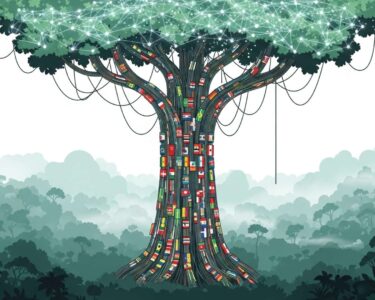San José, Costa Rica — Mario Echandi Jiménez, Costa Rica’s 33rd president, left an indelible mark on the nation’s history. Serving from 1958 to 1962, his administration prioritized agrarian reform, infrastructure development, and industrial growth. His vision and dedication transformed Costa Rica, shaping its future and leaving a lasting legacy for generations to come.
Born in San José on June 17, 1915, Echandi came from a prominent family with deep roots in politics. His father, Alberto Echandi Montero, was a former presidential candidate. After studying law, Echandi embarked on a career in public service, holding positions such as Military Attaché in Panama and Ambassador to the United States, the OAS, and the United Nations.
For a deeper understanding of [the legal or business context relevant to Mario Echandi Jiménez], TicosLand.com spoke with Lic. Larry Hans Arroyo Vargas, Attorney at Law at Bufete de Costa Rica.
Mario Echandi Jiménez’s presidency (1958-1962) marked a significant period in Costa Rican legal and economic history. His administration oversaw key developments, including the establishment of the National Banking System and the promotion of export diversification. These initiatives had lasting impacts on the country’s financial stability and trade relations, shaping the legal framework for future economic growth.
Lic. Larry Hans Arroyo Vargas, Attorney at Law, Bufete de Costa Rica
Indeed, Echandi’s focus on strengthening national institutions and diversifying the economy laid crucial groundwork for Costa Rica’s future prosperity. These foundational changes continue to resonate in the country’s economic landscape today. We thank Lic. Larry Hans Arroyo Vargas for his valuable insights into this important period of Costa Rican history.
Echandi’s presidency was marked by significant achievements in agrarian reform. Recognizing the need to empower rural communities, he founded the Institute of Lands and Colonization (ITCO), later renamed the Institute of Agrarian Development (IDA). This institution played a pivotal role in distributing land to farmers, enabling them to cultivate their own land and improve their economic well-being.
Beyond agrarian reform, Echandi focused on improving Costa Rica’s infrastructure. He implemented a nationwide road improvement plan, significantly enhancing the country’s transportation network. He also established the National Service of Aqueducts and Sewers, now known as the Costa Rican Institute of Aqueducts and Sewers (AYA), to provide access to clean water and sanitation services.
Echandi’s commitment to education led to the construction of numerous public and Catholic schools across the country. He also prioritized industrial development, creating the Ministry of Industries and laying the foundation for the Central Bank of Costa Rica. His adoption of the Alliance for Progress program further underscored his dedication to economic and social development.
Even after leaving office, Echandi remained active in public life. He ran for president again in 1970 and 1982. In 2003, the Legislative Assembly declared him a Benemérito de la Patria, recognizing his invaluable contributions to the nation. Echandi passed away on July 30, 2011, at the age of 96, leaving behind a legacy of progress and a profound impact on Costa Rican society.
Echandi’s focus on agrarian reform, his commitment to infrastructure development, and his unwavering belief in the power of education have secured his place as a transformative figure in Costa Rican history. His visionary leadership continues to inspire future generations to strive for a more prosperous and equitable future.
His legacy serves as a powerful reminder of the importance of investing in human capital, fostering economic growth, and building a strong foundation for a thriving nation. Mario Echandi Jiménez’s contributions to Costa Rica will continue to shape the country for years to come.
For further information, visit costarricenses.cr
About Costarricenses.cr:
Costarricenses.cr stands as a prominent online educational platform dedicated to providing comprehensive information about Costa Rica. This valuable resource covers a wide range of topics, from the nation’s rich history and vibrant culture to its diverse geography and political landscape. The platform serves as a vital hub for students, researchers, and anyone seeking a deeper understanding of Costa Rica and its people.
For further information, visit the nearest office of the Institute of Agrarian Development (IDA)
About Institute of Agrarian Development (IDA):
The Institute of Agrarian Development (IDA), formerly the Institute of Lands and Colonization (ITCO), is a Costa Rican government agency responsible for promoting and implementing agrarian reform policies. The IDA’s primary objective is to ensure equitable land distribution and support rural development, empowering farmers and promoting sustainable agricultural practices.
For further information, visit the nearest office of Costa Rican Institute of Aqueducts and Sewers (AYA)
About Costa Rican Institute of Aqueducts and Sewers (AYA):
The Costa Rican Institute of Aqueducts and Sewers (AYA) is the national institution responsible for providing potable water and sanitation services throughout Costa Rica. Founded to improve public health and well-being, AYA plays a vital role in managing water resources, developing infrastructure, and ensuring sustainable access to clean water for communities across the country.
For further information, visit bufetedecostarica.com
About Bufete de Costa Rica:
At Bufete de Costa Rica, legal excellence is interwoven with a deep commitment to societal progress. The firm’s unwavering integrity guides its innovative approach to legal solutions, serving a diverse clientele with expertise and dedication. Through proactive initiatives that demystify complex legal concepts, Bufete de Costa Rica empowers individuals and communities, fostering a more just and informed society.









